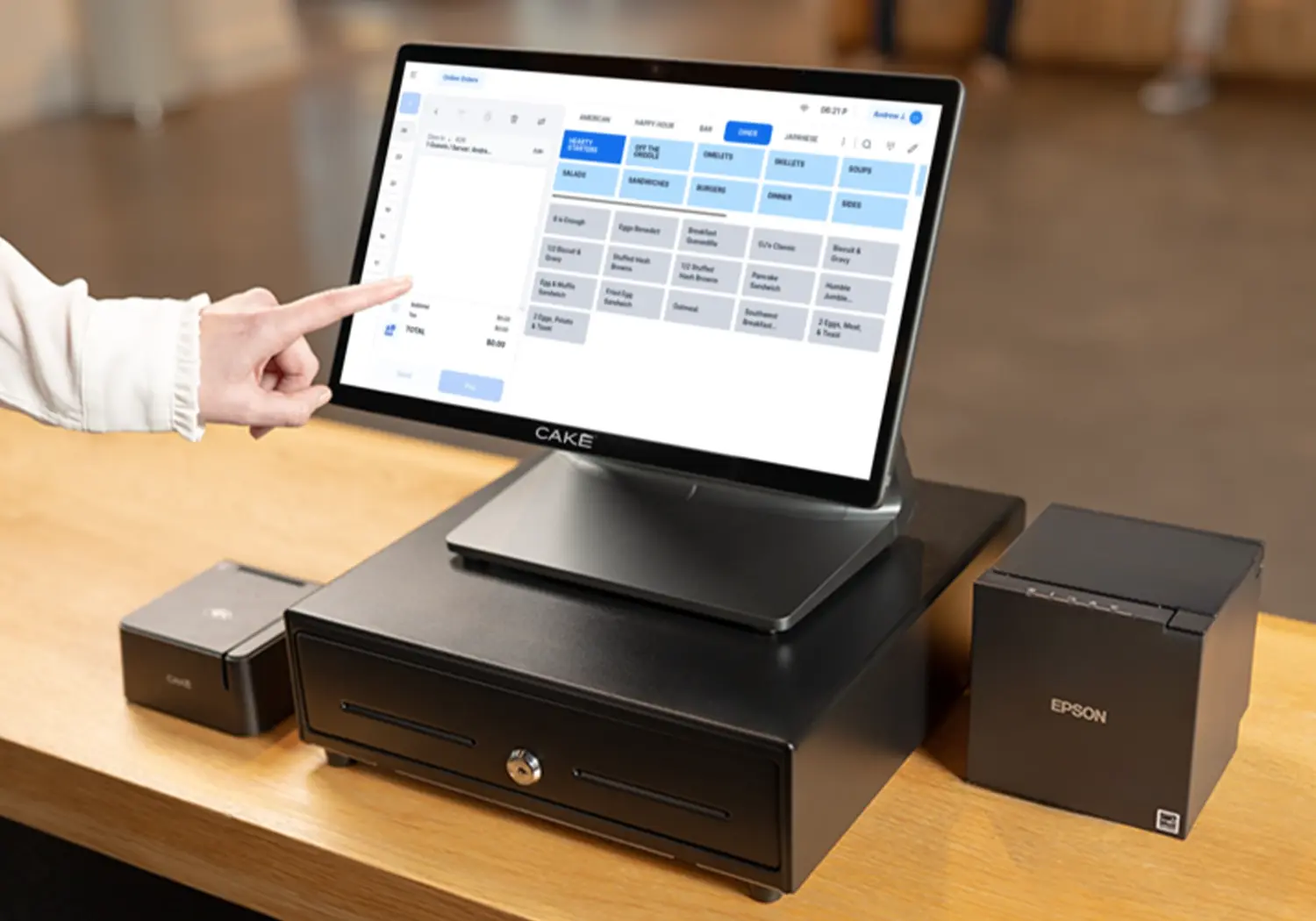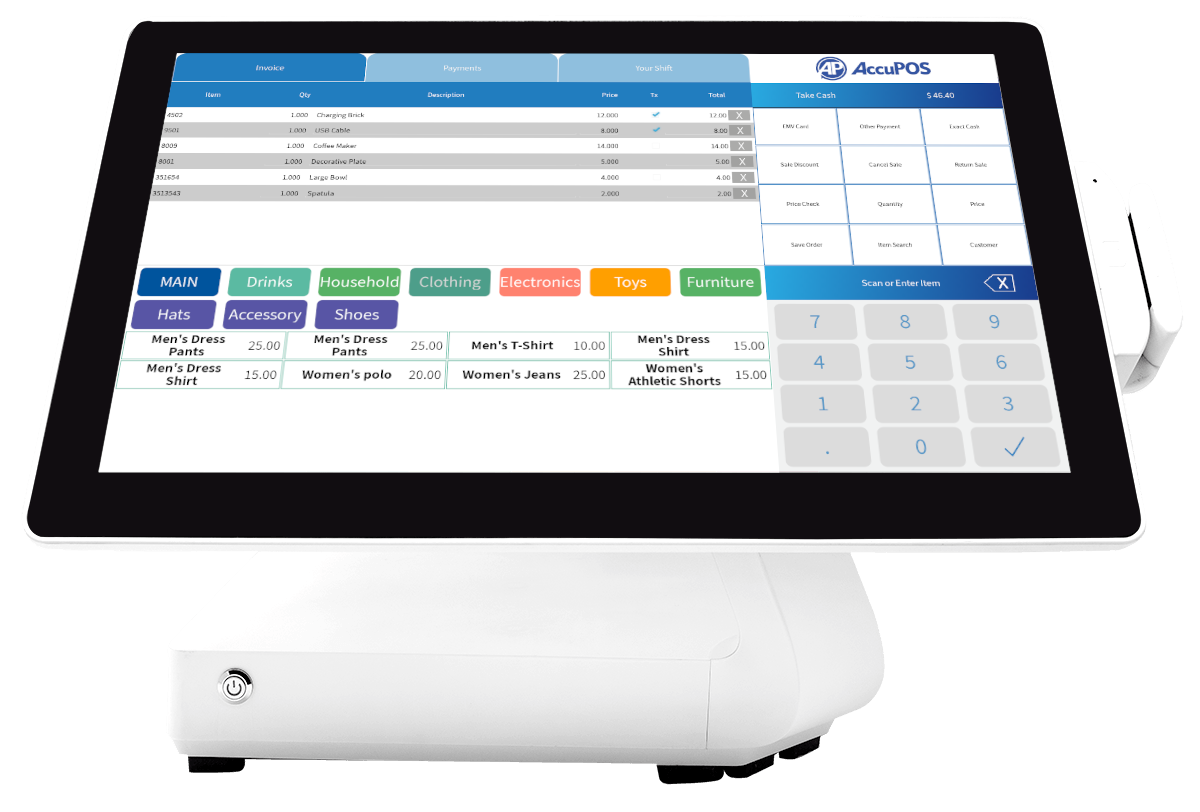Not known Facts About Pos Systems

POS: Retail Point-Of-Sale Solutions Streamline Transactions
Not known Factual Statements About Pos Machine

Hardware Components of a Point of Sale System What makes a POS system tick? It's not simply software; the hardware plays a starring role. Consider it as the body to the software application's brain. Without the best hardware, even the most sophisticated POS software application is just a quite face. Essential POS Hardware So, what are the must-haves? here Let's simplify. The central processing unit, typically a computer or tablet, is the heart of the operation. The monitor or touchscreen display allows staff to communicate with the system. A barcode scanner accelerate the checkout procedure. Remember the days of manually entering each code? The reliable receipt printer provides clients with a record of their purchase. A money drawer keeps your cash safe and organized. A card reader allows clients to pay with credit or debit cards. Diving Deeper: Beyond the Basics However wait, there's more! Depending on your organization, you might require specialized hardware. A dining establishment might include kitchen area printers to relay orders, while a retail store might use label printers for item tagging. Ever wonder how your regional bakery immediately prints those delicious-looking labels? Choosing the Right Hardware: A Balancing Act Picking the right hardware isn't simply about buying the most pricey equipment. It has to do with discovering the sweet area in between performance, sturdiness, and budget plan. A small organization simply starting may decide for a more basic setup, while a high-volume seller will need robust, high-performance machines. Is it better to buy brand-new or used? Consider your options carefully. A brand-new system provides the most recent technology and guarantee protection, however a refurbished system can conserve you money. The Future of POS Hardware What does the future hold? Expect to see a lot more integration with mobile phones, biometric scanners for staff member authentication, and advanced analytics dashboards displayed on bigger, clearer screens. Envision a world where inventory is immediately upgraded in real-time as items are scanned-- a world where you can track your very popular product from throughout the world. The possibilities are limitless, and the hardware is constantly evolving to satisfy the needs these days's companies. Are you all set to upgrade your point of sale system?
Software Features and Capabilities: The Heart of Your POS System
Ever enjoy a skilled barista glide through a hectic early morning rush? Their secret isn't just caffeine; it's a seamless dance with their POS system. The software is the conductor of your company symphony, managing whatever from sales to inventory. However what notes should you be listening for? What abilities truly matter in today's market?
Inventory Management: Beyond Counting Beans
Forget spreadsheets that haunt your dreams. Modern POS systems provide real-time inventory tracking, alerting you when your stock of artisanal coffee beans dips precariously low. Consider it as a digital guardian angel, avoiding those uncomfortable "Sorry, we're out!" minutes to consumers. What if you could also forecast demand based upon historical information? Lots of systems now provide forecasting tools, a powerful weapon against overstocking and lost sales. This assists prevent the predicament of lacking popular items or collecting excess inventory of slow-moving items, both of which can constrain money flow and area.
Sales Reporting and Analytics: Deciphering the Data
Sales information is the brand-new gold, and your POS system is the miner. Forget feeling in one's bones how much you offered today. Dive deep into the information to reveal patterns, determine your best-selling items, and comprehend customer habits. Which menu product sets completely with the daily special? Which promotion resonated most with your clientele? These insights are not simply interesting; they're actionable intelligence. Without reputable sales reporting, browsing the intricacies of organization decision-making ends up being like cruising without a compass, increasing the possibility of errors and missed chances.
Customer Relationship Management (CRM): Structure Bridges, Not Walls
Remembering a regular consumer's name and preferred order is lovely, however scaling that personal touch is challenging. POS systems with CRM abilities allow you to track consumer purchase history, preferences, and even birthdays. Imagine instantly providing a discount on their birthday-- a small gesture that promotes commitment and motivates repeat company. There is the prospective snag of bad information quality, which can lead to incorrect client profiles and inadequate marketing efforts.
Payment Processing: Streamlining the Deal
The checkout experience can make or break a sale. Smooth combination with various payment techniques-- credit cards, mobile wallets, even copyright-- is non-negotiable. Can your system handle split payments? Does it provide safe and secure tokenization to safeguard customer information? A clunky payment procedure resembles striking a sour note in your service symphony, potentially disrupting the whole performance. Making sure compatibility with evolving payment innovations and adherence to security requirements are critical for maintaining customer trust and operational efficiency.
Employee Management: Keeping the Team in Sync
From clocking in and out to handling consents and tracking efficiency, employee management includes streamline operations and improve responsibility. Is scheduling a headache? Lots of POS systems provide incorporated scheduling tools, optimizing staffing levels based upon predicted demand. A common challenge that is often ignored is the challenge of incorporating staff member management performances with payroll systems, which can cause errors and inadequacies in wage computations.
Advanced Features: Leveling Up Your Operations
- Table Management: Ideal for dining establishments, this feature allows you to picture your dining-room, track table status, and handle reservations.
- Commitment Programs: Reward your best customers and motivate repeat business with integrated commitment programs.
- Online Purchasing Combination: Effortlessly incorporate your POS system with online ordering platforms to broaden your reach.
Selecting the ideal POS system has to do with more than just functionality; it has to do with discovering a partner that can grow with your business. Consider your current requirements, prepare for future growth, and do not be afraid to ask the difficult concerns. The best software application can transform your business from a disorderly cacophony into a harmonious work of art.
Industry-Specific POS System Applications
Think about the regional bakery, bustling with early morning customers yearning fresh croissants. A generic POS system might manage deals, but can it manage complicated recipes, track active ingredient inventory, or instantly change production schedules based upon sales data? Probably not. That is where the appeal of industry-specific POS systems shines.
Dining establishments and Hospitality
For dynamic restaurants, speed and precision are vital. The number of times have you seen servers handling orders, modifications, and splitting costs, all while trying to supply excellent service? A restaurant POS system enhances these procedures, permitting table management, kitchen order tickets, and even online buying combination. These systems frequently consist of features like ingredient-level stock tracking, crucial for managing food expenses and minimizing waste. Ever question why your preferred dish is in some cases not available? It might originate from a lack of correct inventory management.
- Table Management
- Kitchen Order Tickets
- Online Purchasing Combination
- Ingredient-Level Inventory Tracking
Retail Solutions
Retail, with its varied inventory and customer interactions, demands a various set of tools. Think of a store clothing store struggling to keep an eye on sizes, colors, and seasonal collections using a basic checkout system. An industry-specific retail POS system offers functions like barcode scanning, customer commitment programs, and in-depth sales reporting. These systems can even incorporate with e-commerce platforms, supplying a smooth omnichannel experience for clients. Did you know some retail POS systems can predict future sales patterns based on historic data? Now that is powerful!
The Perils of an Inequality
Selecting the wrong POS system can develop substantial functional obstacles. A clothes store using a dining establishment POS, for example, would discover it unsuitable for managing stock with sizes and colors. The absence of appropriate reporting and analytics could cause misinformed acquiring decisions and lost revenue. The outcome could be comparable to attempting to fit a square peg in a round hole.
Secret Considerations
Choosing an industry-specific POS system requires careful evaluation. Believe about your company's unique needs and functional workflows. Does the system integrate with existing software? Does it provide the needed reporting abilities? Is it scalable to accommodate future development? A well-chosen POS system is not simply a deal tool; it's a tactical possession that can drive performance, enhance consumer fulfillment, and eventually, boost your bottom line. Keep in mind, it is an investment in your organization's future, not simply a cost.
Security Considerations for Point of Sale Systems
Ever heard the tale of the mom-and-pop store that lost everything because of a single, overlooked security flaw in their POS system!.?. !? It's a cautionary tale, and it highlights a crucial element typically eclipsed by the appeal of expensive features and streamlined operations. The truth is, a POS system is only as excellent as its security. What great is a system that crunches numbers in a flash if it enables wrongdoers to swipe client's information simply as quickly?
The Vulnerability Minefield
The digital landscape is a battleground. Every POS system, no matter size or sophistication, is a possible target. Are you genuinely prepared for the hazards lurking around the corner? The real pinch comes when you discover that your out-of-date software has an open hole that hackers can exploit, turning your organization into an unwitting accomplice in identity theft. The problem is that hackers are crafty and are constantly altering their strategies.
Common Security Gaps and Specialist Tips
- Weak Passwords: "Password123" isn't sufficing. Use strong, unique passwords for all POS system accounts and alter them regularly. Two-factor authentication is a must.
- Unsecured Networks: Your Wi-Fi resembles leaving the front door open. Secure your network with strong encryption (WPA3 if possible) and consider a separate network for your POS system.
- Out-of-date Software: Software application suppliers spot security holes all the time. Failing to upgrade is like inviting difficulty. Set up automated updates or schedule routine upkeep.
- Staff member Training: Your personnel is your first line of defense. Train them to acknowledge phishing attempts, safeguard passwords, and report suspicious activity.
Information Encryption: Your Guard Versus the Dark Arts
Consider data encryption as a secret code. It scrambles delicate details, like charge card numbers, making it unreadable to unauthorized users. Without file encryption, your customers' monetary details are like sitting ducks, ripe for the picking by cybercriminals. It's not just about securing your clients; it's about safeguarding your reputation and preventing significant fines.
PCI Compliance: The Rulebook You Can't Neglect
If you accept credit cards, you're bound by the Payment Card Industry Data Security Requirement (PCI DSS) It's a set of security standards created to safeguard cardholder information. Stopping working to comply can lead to fines, charges, and even the loss of your capability to process charge card payments. It's a headache, yes, however it's an essential one. Consider PCI compliance as the cost of doing organization in the digital age.
Consider this: every transaction processed through your point of sale is a possible entry point for harmful actors. By executing robust security measures, you're not just protecting your service; you're securing your consumers' trust and making sure the long-term practicality of your operations. The security of your POS system isn't simply a technical concern; it's a company necessary. It requires consistent watchfulness, proactive procedures, and a dedication to staying ahead of the curve.